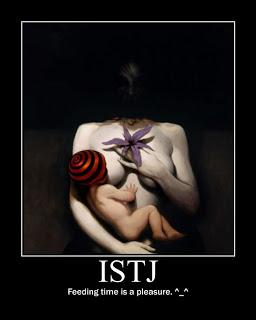By no means do I feel this is an all-encompassing picture of who I am. Quite the contrary. However, this is a quick and easy glimpse to help you understand with whom you are dealing when you hop onto the blog or FB page.
I am an ISTJ (introverted, sensing, teaching, judging) personality on the Briggs-Myers personality scale. According to this site and their particular test, my results are as follows and they actually fit me fairly well:
"The ISTJ personality type is the second most popular one (11.6% of the U.S. population). “Only the facts, please” is their motto – ISTJ personalities respect facts greatly and tend to accumulate a lot of information in their own memory. One of the key contributing factors is their S trait, which allows ISTJs to analyze the surroundings quite effortlessly.
Due to their straightforward approach, ISTJs may encounter difficulties when it becomes necessary to comprehend a competing theory or idea. However, people with this personality type are nearly unstoppable if they believe that a specific idea is valuable and can be implemented – they will consider it their duty to establish and maintain a smooth operation. As soon as the new procedure proves its usefulness (i.e. it becomes apparent that the new approach actually works), ISTJs will put a lot of effort to enable its successful implementation, even at the expense of their own health.
ISTJs tend to be extremely thorough, always checking the facts and not assuming anything. ISTJs are also respected for their exceptional loyalty to their duty – their accuracy, patience and ability to concentrate make them ideal employees in many professions. Not surprisingly, people with this personality type gravitate towards traditional, hierarchical institutions – public service, law, military etc.
ISTJ personalities spend an enormous amount of time and energy performing every task they see as important, especially it contributes to the achievement of a specific goal. However, such a commitment also has a negative side – an ISTJ will refuse to budge and spend at least some of their time doing things that they do not see as meaningful or practical, e.g. some social rituals. ISTJ personalities prefer to do things alone, but can also work as part of a team if necessary.
ISTJs enjoy being responsible for their actions and love the power that stems from this. They are usually jacks-of-all-trades and this can potentially lead to many significant achievements in diverse areas – ISTJs tend to be bright, logical and wise individuals, characterized by their desire to seek secure and stable life.
Like other introverted personalities with a well-developed T trait, ISTJs are often (mistakenly) seen as indifferent and cold. Of course, it is understandably difficult for an ISTJ to reveal their emotions or express affection, but that does not mean that they have no feelings or are insensitive.
ISTJs are easily irritated by other people’s shortcomings – they see their own promises as sacred and cannot understand how someone could consciously fail to meet their obligations. This can be a significant disadvantage at times, as some people can abuse the ISTJ’s strong sense of duty by overloading them with work.
ISTJ personalities tend to keep their opinions to themselves, unless someone asks them directly. People with this personality type are very direct – for them, the truth is always far more important than sensitivity. This ruthless judgment is irreplaceable in refereeing or legal work – where other people might waver, the ISTJ will make the difficult decision while ignoring the emotional background.
ISTJs respect traditions and do their best to adhere to the existing rules and guidelines. In some cases, this trait can be so strong that the ISTJ will not break the rules even when the consequences for breaking them pale in comparison to what would happen if those rules were followed.
ISTJs are not particularly good at listening to their own (and especially other people’s) feelings. Consequently, they may face difficulties when it is necessary to understand other people’s emotional needs. On the other hand, ISTJs rarely have any difficulties coping with emotionally charged situations – they can always keep a cool head and act rationally."
Oddly enough, though this describes me nearly perfectly as a person, when it comes to parenting, I'm far from it. I work hard to be far from it, though.

"ISTJ parents are likely to be strict, traditional and very devoted. They will do their best to ensure that their children grow up in a stable and clearly structured environment, respectful of the authority and aware of their role and place within the society. ISTJ personalities are likely to enjoy the parenthood as it gives them an excellent opportunity to contribute to the continuity and stability of their family, community and society.
ISTJs may have difficulties meeting their children’s emotional needs as people with this personality type are not naturally sensitive. They will be very loyal and devoted, but recognizing and dealing with emotions is not something that an ISTJ is likely to feel comfortable with. This is where they may have to rely on their partner, especially if their child is quite emotional and sensitive.
ISTJ parents are also likely to have very high standards, as well as be patient and hard-working – naturally, they will expect their children to share these values as well. Such an approach will probably help their children succeed in life, but may also create a distance between them and the ISTJ, especially during the adolescent years."
I have made a conscious effort to not be this parent and of that I am quite proud. Aside from "very devoted" and "stable," I am proud to say this does not describe me at all. This says to me that though we have innate traits, we also have choices we get to make about who we are, when, and why. Don't like something about ourselves? We get to choose to change it. Choose not to change it? That's OK, but then we have to own that choice, too.
Who are you innately as a person? As a parent? Do you go with it happily or are there parts of the descriptor you're working to change?

